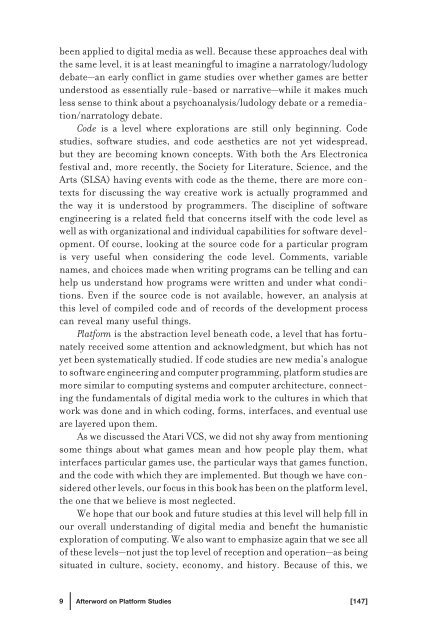Racing the Beam : the Atari Video Computer System - Index of
Racing the Beam : the Atari Video Computer System - Index of
Racing the Beam : the Atari Video Computer System - Index of
You also want an ePaper? Increase the reach of your titles
YUMPU automatically turns print PDFs into web optimized ePapers that Google loves.
een applied to digital media as well. Because <strong>the</strong>se approaches deal with<br />
<strong>the</strong> same level, it is at least meaningful to imagine a narratology/ludology<br />
debate—an early confl ict in game studies over whe<strong>the</strong>r games are better<br />
understood as essentially rule-based or narrative—while it makes much<br />
less sense to think about a psychoanalysis/ludology debate or a remediation/narratology<br />
debate.<br />
Code is a level where explorations are still only beginning. Code<br />
studies, s<strong>of</strong>tware studies, and code aes<strong>the</strong>tics are not yet widespread,<br />
but <strong>the</strong>y are becoming known concepts. With both <strong>the</strong> Ars Electronica<br />
festival and, more recently, <strong>the</strong> Society for Literature, Science, and <strong>the</strong><br />
Arts (SLSA) having events with code as <strong>the</strong> <strong>the</strong>me, <strong>the</strong>re are more contexts<br />
for discussing <strong>the</strong> way creative work is actually programmed and<br />
<strong>the</strong> way it is understood by programmers. The discipline <strong>of</strong> s<strong>of</strong>tware<br />
engineering is a related fi eld that concerns itself with <strong>the</strong> code level as<br />
well as with organizational and individual capabilities for s<strong>of</strong>tware development.<br />
Of course, looking at <strong>the</strong> source code for a particular program<br />
is very useful when considering <strong>the</strong> code level. Comments, variable<br />
names, and choices made when writing programs can be telling and can<br />
help us understand how programs were written and under what conditions.<br />
Even if <strong>the</strong> source code is not available, however, an analysis at<br />
this level <strong>of</strong> compiled code and <strong>of</strong> records <strong>of</strong> <strong>the</strong> development process<br />
can reveal many useful things.<br />
Platform is <strong>the</strong> abstraction level beneath code, a level that has fortunately<br />
received some attention and acknowledgment, but which has not<br />
yet been systematically studied. If code studies are new media’s analogue<br />
to s<strong>of</strong>tware engineering and computer programming, platform studies are<br />
more similar to computing systems and computer architecture, connecting<br />
<strong>the</strong> fundamentals <strong>of</strong> digital media work to <strong>the</strong> cultures in which that<br />
work was done and in which coding, forms, interfaces, and eventual use<br />
are layered upon <strong>the</strong>m.<br />
As we discussed <strong>the</strong> <strong>Atari</strong> VCS, we did not shy away from mentioning<br />
some things about what games mean and how people play <strong>the</strong>m, what<br />
interfaces particular games use, <strong>the</strong> particular ways that games function,<br />
and <strong>the</strong> code with which <strong>the</strong>y are implemented. But though we have considered<br />
o<strong>the</strong>r levels, our focus in this book has been on <strong>the</strong> platform level,<br />
<strong>the</strong> one that we believe is most neglected.<br />
We hope that our book and future studies at this level will help fi ll in<br />
our overall understanding <strong>of</strong> digital media and benefi t <strong>the</strong> humanistic<br />
exploration <strong>of</strong> computing. We also want to emphasize again that we see all<br />
<strong>of</strong> <strong>the</strong>se levels—not just <strong>the</strong> top level <strong>of</strong> reception and operation—as being<br />
situated in culture, society, economy, and history. Because <strong>of</strong> this, we<br />
9 Afterword on Platform Studies [147]


